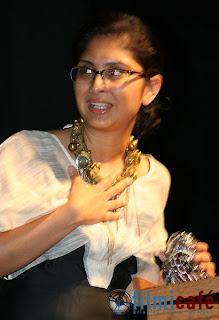A few words about "If on a Winter's Night..." first. Calvino gives a whole new meaning to "frustrated expectations" as he tells the story of a Reader who starts reading a novel but ends up reading 10 beginnings of novels instead, as something always snatches the book from his hands right when it starts getting interesting.
The motif of real life events interrupting a story and then giving birth to another story seems to be the thread connecting the book and the film. But there are other more subtle threads too, and they are revealed one by one as we travel inside Meenaxi's world.
Meenaxi is the story of a muse. Nawab (Raghuvir Yadav, of Lagaan and Peepli Live fame), a very successful writer, receives the visit of a mysterious woman - Meenaxi (Tabu) - who offers to help him write his next novel by dressing herself up as the main character.
Intrigued, slightly outraged and still unconvinced, Nawab finds himself nonetheless interested in Meenaxi even when he can't admit he wants to write her story. When he finally starts writing it... we step into a fairytale. A fairytale of a road, a fallen kite and a black coat flowing off the hero's shoulder.
"You can start a story with just a face... with a feeling... and sometimes with just the smell of flowers", Meenaxi says in the first scene where we (and Nawab) meet her. And so it does, to the sweet sound of Sonu Nigam's voice.
...whimsical...
But no sooner have we started getting interested in Kameshwar's story, that we are rudely interrupted, just like Calvino's Reader. The whimsical fate that keeps interrupting the Reader's journey inside each book, is replaced in the movie by the muse herself, Meenaxi, as capricious and demanding as any goddess.
Namak: And surely she must have the stomach of a goddess because despite stuffing her face with something every time she appears, she doesn't seem to gain any weight.
Dolce: Give her a break, a woman needs her energy to do all that talking and deal with this sulky Nawab guy. Shut up guys, this is a serious post! Sheesh!
Meenaxi keeps complaining about the characters in Nawab's stories, about the pace of the story, about its capacity to entertain or to reflect reality. So Nawab starts story after story (we see three of them unfolding) in a series of attempts to please her. My interpretation of the movie is that he succeeds in the end, even if we are not shown the final cut. And I find confirmation for my reading in Calvino's words, in the second last paragraph of his book:
"In ancient times a story could end only in two ways: having passed all the tests, the hero and the heroine married, or else they died. The ultimate meaning to which all stories refer has two faces: the continuity of life, the inevitability of death."
In order for the story to live, the author must set it free by removing himself from it.
...mysterious...
All ten stories in the book talk about a mysterious woman (or sometimes even two). In fact, all the stories become interesting the moment the woman's secret is foreshadowed. Similarly, as is evident from the very beginning, Meenaxi is not as easy to read as she claims in the beginning, in fact the more the story progresses the more enigmatic she becomes while she gradually takes over the story....masculine...
They may be stories with and about women, but both the book and the movie offer a very male perspective, whether it's the fact that Calvino's novels are always narrated by a man, or the fact that Kunal Kapoor's characters are always the pivotal point of each story.
Dolce: I think we need a gratuitous shot of Kunal Kapoor right about here, eh?
Namak: What can I say? When you're right, you're right!Heck, let's do a video too while we're at it!
...frustrating...
Calvino's book and Hussain's film can be such frustrating experiences if one doesn't know what to expect. And whoever thinks that If on a Winter's Night is about the novels, and Meenaxi is about Meenaxi's stories, hasn't really understood much... But seen with the patient eye of the post-modern art lover, they can become an experience rich in flavour and texture, with some delicacy to be sampled at every step. When instead of one book we are given eleven stories, and instead of one movie we are given four, how can we not immerse ourselves in each of them with the enthusiasm but also the fickleness of a passionate art devotee?...innovative...
While If on a Winter's Night gave the act of reading a new face, Meenaxi gave the act of writing and making movies a whole new meaning, which may have been old news for European cinema (Otto e Mezzo being a good example of a somewhat similar theme), but was certainly innovative for Indian cinema. Perhaps even before its time, as the movie flopped and even now is not very popular with Hindi movie lovers. How that is possible, I have no idea, since Meenaxi has some of the most exquisite picturizations, some of the most intelligent symbolic imagery, some of the most melodious AR Rahman songs and, Dolce feels the need to mention again, one of the most beautiful men alive.
























